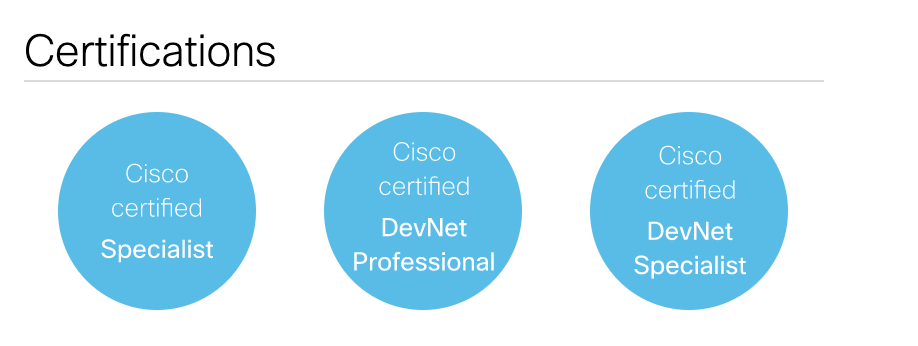As we get ever closer to the highly anticipated availability of Cisco DevNet Certifications exams (February, 2020), the excitement is building for those wishing to take and pass the DEVNET CCNP. For the professional track, exam requirements are similar to the CCNP current R&S track. In order to complete your DevNet Professional Certification you will need to pass one core and one concentration exam. DEVCOR 350-901 is the core exam, and you can then pick from one of eight concentration exams. The DEVCOR 350-901 exam tests a candidate’s knowledge of software development and design including using APIs, Cisco platforms, application deployment and security, and infrastructure and automation.

DevNet Certifications are designed for both network professionals and software developers to optimize and write applications for the network of today, and help people choose the technology skills they want to develop and grow.
In this blog we will focus on what you need to know, and suggest study materials, to pass the exam for a Cisco DevNet Specialist Certification in Developing Applications Using Cisco Core Platforms and APIs (DEVCOR 350-901). I’ll be hosting a webinar on the 17th December to take an in-depth look at preparing for this exam, and hope you’ll join me.
The full list of exam topics can be found on the Cisco certification website page and the exam overview here. More information about DevNet certifications is available on the DevNet website.
There are three ways you can approach this exam:
- On its own – providing DEVNET Certified Specialist
- As the second exam (with DEVNET Concentrate exam) — providing DEVNET Certified Professional
- As part of a re-certification for your Cisco Certified CCNP
Every professional level exam earns a learner a Specialist Certification, including the DevNet Technology Core (DEVCOR). If you pass DEVCOR, you will earn a Cisco DevNet Specialist Certification in Developing Applications Using Cisco Core Platforms and APIs.
Let’s take a deep dive into some of the exam sections:
1.0 Software Development and Design
A portion of understanding software development is to recognize the fundamentals of programmability. In this segment, you will be tested on your knowledge of Git, Python, data structures basic understanding of APIs and how they work, as well as a basic understanding of application hosting and application design. Deliver scalable, manageable infrastructure optimized for microservice architectures. Deploy Docker and microservices alongside the environments and tools they already run today.
Suggested study material
- Setting up your Linux (Ubuntu) workstation as a development environment
- Setting up your Windows workstation as a development environment
- Setting up your macOS workstation as a development environment
- What is a Development Environment and why do you need one?
- A brief introduction to Git
- Intro to Python Part 1
- Intro to Python Part 2
- Coding 202: Parsing JSON using Python
- Introduction to XML
- Introduction to the Guest Shell
- Chat-Ops with Webex Teams and Python
- Firepower Management Center (FMC) REST API token-based authentication
- Exploring the ‘webexteamssdk’ Webex Teams Python Library
- Git 100: Basics of the git version control system
- Git 101: Branching
- Git 102: Using git with servers
- Introduction to Webex Teams Apps
- Modern Application Development
- Understanding the OAuth Flow of a Webex Teams Integration
- Webex Teams Security and Access: Tokens, OAuth, Scopes, and Roles
2.0 Using APIs
Cisco Services APIs remove barriers to enterprise automation, increase productivity, help shorten sales cycles, and reduce operating expenses. These APIs empower users to access information and use Cisco intellectual capital in new and innovative ways to increase productivity and add new value to their business. APIs provide users with the flexibility to manage their network or their customers’ networks by providing value-added services through innovation and make them available to their end-users.
Suggested study material
- What is REST? What are APIs
- Intro to Coding and APIs
- Getting started with REST APIs
- Hands On: Use Postman to interact with REST APIs
- Prime Infrastructure API 101: REST Basics
- Invoke Webex REST APIs from the interactive documentation
- Building Python Requests to Read and Create Webex Teams API Items
- Introduction to XML
- Introductory UCS Director REST API, Custom Tasks and Workflow Creation Part I
- Meraki Dashboard API Using Postman
- Meraki Location Scanning API Python
- Run a Webex Teams Bot Locally
3.0 Cisco Platforms
Automation and Orchestration can help your business automate complex tasks so they can be carried out in minutes, with minimal or zero manual effort. Orchestration software controls the automation tasks that make up your company’s service delivery workflows. This section focuses on API requests to implement ‘chatops’ with Webex Teams API and using the Meraki Dashboard and location APIs.
Suggested study material
- Exploring Firepower Management Center (FMC) REST APIs
- Introduction to Meraki Integrations
- Introduction to Cisco DNA Center Northbound APIs
- Cisco DNA Center API Overview
- Cisco DNA Center Northbound API Modules
- What and Why of Model Driven Programmability
- Introducing YANG Data Modeling for the Network
4.0 Application Deployment and Security
Focus on building features by using security guardrails in your CI/CD pipelines to automate connection tracing, segmentation, behaviour analysis, threat detection, forensics, and containment. Describe how end-to-end encryption principles apply to APIs, to ensure secure access and device compliance for end-users when accessing your applications, pipeline, and infrastructure across on-premises and clouds. whilst keeping informed with alerts for incidents and anomalies with service integrations and webhooks.
Suggested study material
5.0 Infrastructure and Automation
Model-driven telemetry inherits the power of models, making it easier to define, consume, and subscribe to the data you want. By modelling that data with YANG, model-driven telemetry can ensure that those vast quantities of data are truly usable. Use structured data (XML or JSON) and YANG to provide REST-like APIs, enabling programmatically access to IOS XE network devices. Constructing a workflow to configure network parameters with Ansible and by Puppet in order to automate infrastructure management and configuration. Deploy applications to the Catalyst 9k repeatedly and reliably.
Suggested study material
- Introduction to Meraki integrations
- Using the Meraki Dashboard API with postman
- Meraki location scanning API Python
- A hands-on introduction to the Cisco Container Platform v3.1
- Advanced Docker features
- Building an IOx Application with Docker
- Introduction to Ansible
- Managing Cisco Compute with Ansible
- Microservices overview
Join me for a webinar on the 17th December to take an in-depth look at the DevNet Developing Applications Using Cisco Core Platforms and APIs (DEVCOR 350-901) exam.
Make sure you check out DevNet’s new certification track offering courses, exams, and real-live Cisco certs for coders and developers. You can read all about the DevNet Certifications launch at Cisco Live in Susie Wee’s blog.
We’d love to hear what you think. Ask a question or leave a comment below.
And stay connected with Cisco DevNet on social!
Twitter @CiscoDevNet | Facebook | LinkedIn
Visit the new Developer Video Channel

CONNECT WITH US